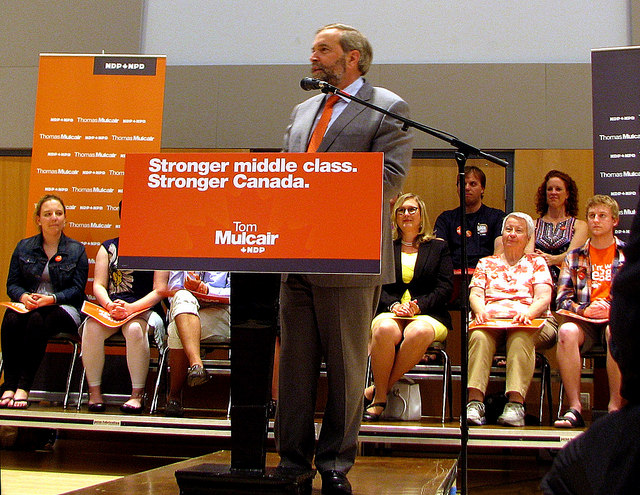Like this article? rabble is reader-supported journalism. Chip in to keep stories like these coming.
Across Canada, NDP federal riding associations are meeting in preparation for an April 8-10 Edmonton convention, where there will be a leadership review.
In a January 22 statement, Tom Mulcair said the party needs to focus on income inequality.
The NDP leader cited links between poverty and ill health, and deplored the impact of social housing shortages on family well-being. His message pointed to inflated bank profits feeding outsized bonuses for bankers, and taxable income hidden offshore.
Prior to this statement Mulcair had made it clear he wants to stay on as leader. In making it, he explains why: to fight for a more equal Canada.
Canada has certainly become more unequal. The growing gap between rich and poor in Canada has been measured, documented and highlighted for all to see by the Canadian Centre for Policy Alternatives, which has been publishing results from its important inequality research project for a decade now.
Mulcair puts himself in the mainstream of social democratic thinking by talking about inequality. The first publication of the Broadbent Institute (created in 2011 as an informal NDP think-tank) focused on inequality.
His emphasis on inequality did not produce electoral success, but former U.K. Labour Party leader Ed Miliband insists reducing inequality makes economic sense. Putting more money in the pockets of the middle class increases consumption, and it is spending by more people that will spur business investment, he points out.
For Miliband, the clinching argument for the economic case is Sweden and Denmark. Two countries with the lowest income inequality, both have high economic growth.
Like Ed Miliband, Bernie Sanders cites Denmark and Sweden. The upstart Democratic presidential candidate, who continues to surprise observers with his voter appeal, points to how these countries outdo the U.S. in providing health care, higher education and basic public services to citizens.
Sanders’s main message is more pointed and direct: “[W]e can no longer tolerate an economy and a political system that has been rigged by Wall Street to benefit the wealthiest Americans in this country at the expense of everyone else.”
Sanders is saying out loud what left political economists have argued for decades: inequality is a byproduct of an unjust economic and political system.
Sanders is calling for a democratic revolution to transform an American economy failing to meet human needs.
The reality is that behind growing inequalities lies an unequal access to economic power. Political power is exercised to protect and grow existing wealth.
Calling for more government spending and higher taxation to reduce inequality would put the NDP offside with Liberal and Conservative party policies, and strengthen its social democratic identity.
Canada was among higher-spending governments until 30 years of retrenchment by successive Liberal and Conservative governments produced less government … and more inequality.
Measured as a percentage of GDP, Canada now ranks among the lowest third of OECD countries in government spending.
A social democratic program to reduce inequality would mean growing government. But in itself more generous social programs do not address the core economic issues facing Canadians.
Showing how the major banks and financial interests dominate the Canadian economy at the expense of creating new jobs and protecting the environment has not been an NDP focus. Yet, putting bank profits before the welfare of regular Canadians comes at a cost to overall prosperity, and is not something that can be fixed by higher bank taxes.
The Canadian economy has been programmed to produce rising inequality by government embrace of conservative economics peddled by corporations. Unequal exercise of economic power is assisted by concentrated media ownership which needs to be addressed by the NDP without fear of offending Postmedia, Global News and Bell Media.
Much like in the U.S., the Canadian economy has been rigged by financial capital. Media malpractice has helped to disguise it.
The NDP has a choice. It can stress social democratic measures to fix inequality, or it can go further and attack the unjust, failing economy, and expose the political choices directed by corporate Canada.
Duncan Cameron is the president of rabble.ca and writes a weekly column on politics and current affairs.
Photo: Laurel L. Russwurm/flickr
Like this article? rabble is reader-supported journalism. Chip in to keep stories like these coming.



